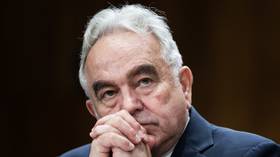Russia and China prove great powers can be good neighbors – Lavrov
Russian Foreign Minister Sergey Lavrov and his Chinese counterpart, Wang Yi, have hailed the strategic partnership between the two nations in complementary articles published on Thursday.
Wednesday marked the 75th anniversary of formal diplomatic relations between Moscow and Beijing. The date came just two days after the People’s Republic of China celebrated its 75th birthday. The Soviet Union was the first internationally recognized nation to establish formal ties with the new Chinese government, and helped it rebuild the country following the devastating civil war in which the communists prevailed over nationalist forces.
Lavrov and Wang noted that the two nations have overcome what the Chinese minister called “bumps” over the past three-quarters of a century. Initially allies, the USSR and PRC had a major falling-out in the late 1950s and early 1960s. Territorial disputes were fully resolved only in 2005.
“Working in the spirit of good-neighborhood, friendship and cooperation, we have managed to build model relations for neighboring great powers,” Lavrov said of the progress made.
The partnership is based on the principles of mutual respect, non-interference in domestic affairs, the absence of ideological aspects of the relationship, and mutual support on the world stage, he added.
The strong current ties bring tangible economic benefits for the Russian and Chinese populations, the senior officials stated. Western economic pressure through trade restrictions has seriously altered bilateral commerce, with Russian energy and foodstuffs prominent in the Chinese market, while mobile phones and cars are flowing in the opposite direction. Cooperation is also growing in terms of direct investment, joint technological projects, education, tourism, and other areas.
Moscow and Beijing, which together champion a new multipolar world order, are benefiting non-Western countries, Lavrov and Wang said. They are “opposing hegemony and power politics, illegal unilateral sanctions and ‘long-arm jurisdiction’, [and] interference in the internal affairs of sovereign states. The two parties actively seek opportunities and development for the countries of the ‘Global South’,” the Chinese minister wrote.
Lavrov claimed that unlike the US and its “satellites,” Russia and China seek to deflate international tensions.
“Since the system of security in Europe and Euro-Atlantic has been totally discredited by the actions of the US and other NATO members, we support serious joint work on the formation of a new architecture of Eurasian security in line with the principle of ‘regional solutions for regional problems’,” he wrote.
The articles were printed by Rossiyskaya Gazeta and the People’s Daily.
You can share this story on social media:








Comments are closed.